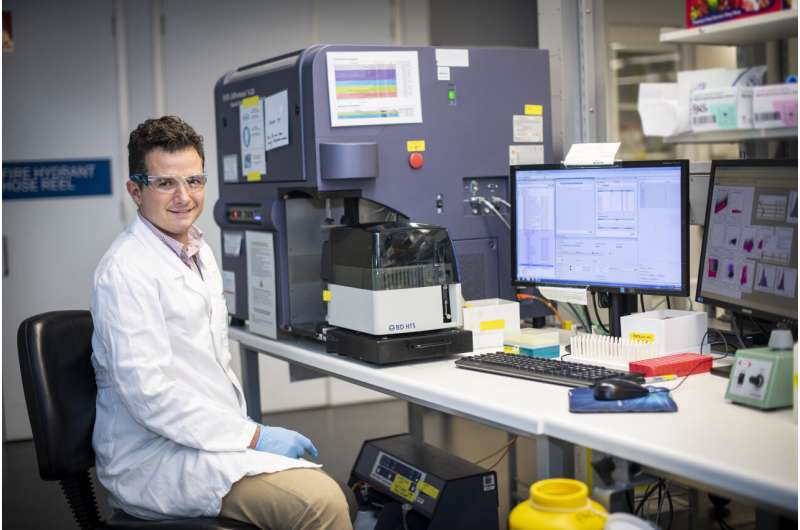Discovery highlights the complex lifestyles of frontline immune cells

WEHI researchers have made a surprise discovery about how immune 'sentinel' cells are maintained, which could have implications for drugs in development for treating cancer.
The researchers studied the impact of deleting specific proteins in immune cells that were responsible for controlling the ability of cells to silence or switch off genes.
They were surprised to find that one population of 'sentinel' immune cells was affected by deletion of a component of the machinery, causing the cells to disappear from skin and lungs completely. This suggests that drugs which inhibit this component to treat diseases, such as cancer, could have unintended consequences for the immune system.
The research was led by Dr. Yifan Zhan, Dr. Yuxia Zhang, Mr Shengbo Zhang, Dr. Michael Chopin, Professor Stephen Nutt and colleagues, and was published in Science Immunology.
A complex issue
The research team studied the role of the polycomb repressive complex 2 (PRC2) in frontline responder immune cells.
Dr. Chopin said the PRC2 was responsible for 'switching off' genes, including in immune cells, which was essential for maintaining their numbers and normal function.
"Our laboratory investigates gene regulation, or the molecular processes inside cells that control how and when the genes encoded by our DNA are used," he said.
"We studied the function of the PRC2 in two immune cell populations that form the first line of defence against infection. These cells provide a critical immune barrier to the external environment, protecting the skin and lungs from microbial invasion."
The research team removed two components of the complex, an enzyme called EZH2 and a structural protein called Suz12, to see how it impacted immune cell development, populations and function.
Deleting EZH2 had no impact on the biology or function of either cell population—with the cells still able to respond to viral infection effectively.
"We surprised to find that the immune cells were largely unaffected by deleting EZH2," Dr. Chopin said.
In contrast, when Suz12 was deleted, certain populations of macrophages, such as those that reside in our skin and lungs, completely disappeared.
"These tissue-resident macrophages are responsible for detecting and ridding the body of a variety of infiltrating bacteria and virus-infected cells, and alerting the body that it is under attack by stimulating the production of inflammatory signals," Dr. Chopin said.
"Tissue-resident macrophages have the unique property of being able to independently maintain their numbers throughout adult life. Our research highlights a key role for Suz12 and PRC2 in controlling this regulatory program of these immune cells."
Unexpected effects
Professor Nutt said it was important to understand the potential knock-on effects of drugs that interfere with the proteins that switch genes off.
"PRC2 has been implicated in many cancers, such as lymphoma. There is significant work being undertaken around the world to develop drugs that target components of the complex to treat cancer.
He said at least one drug already approved for treating a rare type of sarcoma inhibited components of the complex.
"We need to study more closely whether drugs that inhibit the function of EZH2 and Suz12 could have unintended consequences for the immune system," he said.
On the flipside, Professor Nutt said, it was also important to understand what redundancies exist that might prevent drugs having their desired effect.
"The current belief is that inhibiting EZH2 will dampen the immune response, for example if you are wanting to treat immune or inflammatory diseases," Professor Nutt said. "Our research shows that, at least with these specific frontline immune cells, that are active early in infection and trigger other elements of the immune system, that is unlikely to be the case."
Professor Nutt said the research was part of the team's broader focus on gene regulation at a molecular level.
"The normal function of the cells in our bodies relies on each cell's ability to use the appropriate combination of genes from the tens of thousands of genes encoded in our DNA in the right place and at the right time," he said.
"The molecular controls that prevent genes from being used are essential to life."
More information: Yifan Zhan et al, Differential requirement for the Polycomb repressor complex 2 in dendritic cell and tissue-resident myeloid cell homeostasis, Science Immunology (2021). DOI: 10.1126/sciimmunol.abf7268



















